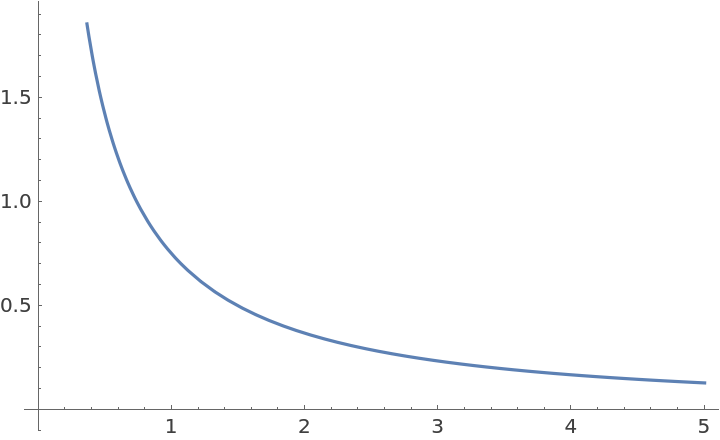Wolfram Function Repository
Instant-use add-on functions for the Wolfram Language
Function Repository Resource:
Evaluate the Lommel function
ResourceFunction["LommelS"][μ,ν,z] gives the Lommel function Sμ,ν(z). |
Evaluate numerically:
| In[1]:= |
| Out[1]= |
Plot S-1/4,2/3(x) over a subset of the reals:
| In[2]:= |
| Out[2]= |  |
Series expansion at the origin:
| In[3]:= |
| Out[3]= |
Evaluate for complex arguments:
| In[4]:= |
| Out[4]= |
Evaluate to high precision:
| In[5]:= |
| Out[5]= |
The precision of the output tracks the precision of the input:
| In[6]:= |
| Out[6]= |
LommelS threads elementwise over lists:
| In[7]:= |
| Out[7]= |
Simple exact values are generated automatically:
| In[8]:= |
| Out[8]= |
Verify recurrence relations satisfied by LommelS:
| In[9]:= | ![With[{\[Mu] = 2, \[Nu] = 3}, ResourceFunction["LommelS"][\[Mu] + 2, \[Nu], z] == z^(\[Mu] + 1) - ((\[Mu] + 1)^2 - \[Nu]^2) ResourceFunction[
"LommelS"][\[Mu], \[Nu], z] // FullSimplify]](https://www.wolframcloud.com/obj/resourcesystem/images/d8e/d8ee3a3f-096b-4592-9be9-a1d566579d82/390a0dd4203e5d7e.png) |
| Out[9]= |
| In[10]:= | ![(* Evaluate this cell to get the example input *) CloudGet["https://www.wolframcloud.com/obj/b894f08b-a7b8-466b-bf3f-403bfdffe4e2"]](https://www.wolframcloud.com/obj/resourcesystem/images/d8e/d8ee3a3f-096b-4592-9be9-a1d566579d82/4279198e40fff7b8.png) |
| Out[10]= |
Express the derivative of LommelS in terms of LommelS:
| In[11]:= | ![With[{\[Mu] = 2, \[Nu] = 3}, D[ResourceFunction["LommelS"][\[Mu], \[Nu], z], z] == \[Nu]/
z ResourceFunction["LommelS"][\[Mu], \[Nu], z] + (\[Mu] - \[Nu] - 1) ResourceFunction[
"LommelS"][\[Mu] - 1, \[Nu] + 1, z] // FullSimplify]](https://www.wolframcloud.com/obj/resourcesystem/images/d8e/d8ee3a3f-096b-4592-9be9-a1d566579d82/1fb1455664270f3e.png) |
| Out[11]= |
| In[12]:= | ![With[{\[Mu] = 2, \[Nu] = 3}, D[ResourceFunction["LommelS"][\[Mu], \[Nu], z], z] == -(\[Nu]/z) ResourceFunction["LommelS"][\[Mu], \[Nu], z] + (\[Mu] + \[Nu] - 1) ResourceFunction[
"LommelS"][\[Mu] - 1, \[Nu] - 1, z] // FullSimplify]](https://www.wolframcloud.com/obj/resourcesystem/images/d8e/d8ee3a3f-096b-4592-9be9-a1d566579d82/3e37f494765c756f.png) |
| Out[12]= |
| In[13]:= | ![(* Evaluate this cell to get the example input *) CloudGet["https://www.wolframcloud.com/obj/daee2cf7-fe31-4c6e-b2f7-5133dd25a85f"]](https://www.wolframcloud.com/obj/resourcesystem/images/d8e/d8ee3a3f-096b-4592-9be9-a1d566579d82/4fe6445e282b1c1f.png) |
| Out[13]= |
Indefinite integrals of the Bessel functions BesselJ and BesselY multiplied by a power function can be expressed in terms of Bessel functions and LommelS:
| In[14]:= | ![With[{\[Mu] = 2, \[Nu] = 3}, D[(\[Mu] + \[Nu] - 1) z BesselJ[\[Nu], z] ResourceFunction[
"LommelS"][\[Mu] - 1, \[Nu] - 1, z] - z BesselJ[\[Nu] - 1, z] ResourceFunction["LommelS"][\[Mu], \[Nu],
z], z] == z^\[Mu] BesselJ[\[Nu], z] // FullSimplify]](https://www.wolframcloud.com/obj/resourcesystem/images/d8e/d8ee3a3f-096b-4592-9be9-a1d566579d82/6642f9df1ec9ce1f.png) |
| Out[14]= |
| In[15]:= | ![With[{\[Mu] = 2, \[Nu] = 3}, D[(\[Mu] + \[Nu] - 1) z BesselY[\[Nu], z] ResourceFunction[
"LommelS"][\[Mu] - 1, \[Nu] - 1, z] - z BesselY[\[Nu] - 1, z] ResourceFunction["LommelS"][\[Mu], \[Nu],
z], z] == z^\[Mu] BesselY[\[Nu], z] // FullSimplify]](https://www.wolframcloud.com/obj/resourcesystem/images/d8e/d8ee3a3f-096b-4592-9be9-a1d566579d82/6cc03eec75d1afe9.png) |
| Out[15]= |
Express the Anger and Weber functions in terms of LommelS:
| In[16]:= | ![AngerJ[n, z] == BesselJ[n, z] + Sin[n \[Pi]]/\[Pi] (ResourceFunction["LommelS"][0, n, z] - n ResourceFunction["LommelS"][-1, n, z]) // FullSimplify](https://www.wolframcloud.com/obj/resourcesystem/images/d8e/d8ee3a3f-096b-4592-9be9-a1d566579d82/19d5c4d0cccc59aa.png) |
| Out[16]= |
| In[17]:= | ![WeberE[n, z] == -BesselY[n, z] - (
1 - Cos[n \[Pi]])/\[Pi] n ResourceFunction["LommelS"][-1, n, z] - (1 + Cos[n \[Pi]])/\[Pi] ResourceFunction["LommelS"][0, n, z] // FunctionExpand // FullSimplify](https://www.wolframcloud.com/obj/resourcesystem/images/d8e/d8ee3a3f-096b-4592-9be9-a1d566579d82/75a94ac826f26980.png) |
| Out[17]= |
The associated Anger–Weber function AngerWeberA can be expressed in terms of LommelS:
| In[18]:= | ![ResourceFunction["AngerWeberA"][n, z] == (
ResourceFunction["LommelS"][0, n, z] - n ResourceFunction["LommelS"][-1, n, z])/\[Pi] // FullSimplify](https://www.wolframcloud.com/obj/resourcesystem/images/d8e/d8ee3a3f-096b-4592-9be9-a1d566579d82/107bcefd45665a64.png) |
| Out[18]= |
The Neumann polynomial NeumannO can be expressed in terms of LommelS:
| In[19]:= | ![Table[ResourceFunction["NeumannO"][n, z] == Binomial[n, Mod[n, 2]]/
z ResourceFunction["LommelS"][1 - Mod[n, 2], n, z], {n, 0, 10}] // Simplify](https://www.wolframcloud.com/obj/resourcesystem/images/d8e/d8ee3a3f-096b-4592-9be9-a1d566579d82/044077068a0dd5cc.png) |
| Out[19]= |
The Schläfli polynomial SchlaefliS can be expressed in terms of LommelS:
| In[20]:= | ![Table[ResourceFunction["SchlaefliS"][n, z] == (n + 1 + (n - 1) (-1)^n) ResourceFunction[
"LommelS"][-Mod[n + 1, 2], n, z], {n, 0, 10}] // Simplify](https://www.wolframcloud.com/obj/resourcesystem/images/d8e/d8ee3a3f-096b-4592-9be9-a1d566579d82/6bc02a5e04686ba0.png) |
| Out[20]= |
This work is licensed under a Creative Commons Attribution 4.0 International License